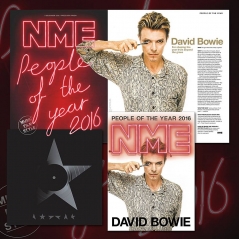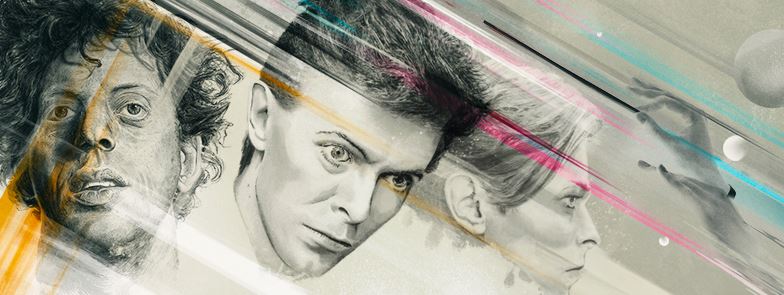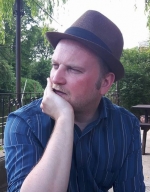A Celebration of David Bowie by Philip Glass at Colston Hall in Bristol

Posted on: 2016-12-11
Our rating:
A David Bowie celebration filtered through the incredible interpretive orchestral voice of Philip Glass and performed with faultless flair and gusto by a passionate conductor and exemplary ensemble, easily one of the musical highlights of the year.
The iconic music of David Bowie was interpreted through the hypnotically unique musical prism of Philip Glass at the Colston Hall in Bristol on Saturday 10 December 2016.
Renowned conductor Charles Hazlewood explained, in a brief but poignant introduction to the concert, that he was just as shocked at the sudden, unexpected passing of Bowie in January this year as the rest of the music-loving world. Surely, the singer, songwriter and actor who had been such a massive, influential force and musical innovator for over five decades couldn't die. Surely not. It was impossible. David Bowie was immortal and would live forever, right? Alas not. And so the world grieved the loss of a musical colossus and irrefutable legend.

Hazlewood therefore wanted to pay his own special tribute to Bowie, a reverential farewell through the only way he knew how - through music. His answer was to put on a show at Glastonbury Festival in the form of a performance of minimalist composer Philip Glass's Heroes Symphony (composed in 1996), from which Glass extracted key themes and musical elements from Bowie (and Brian Eno's) Heroes album and gave them his own personal, unmistakable spin.
The Glastonbury gig went down a storm, with over 20,000 people gathering at the world-famous festival at midnight on 25 June 2016 for a stunning performance of Glass' symphony, with Hazlewood conducting the Army of Generals with members of The British Paraorchestra.
With the same conductor and ensemble reuniting for Saturday's concert, the palpably enthusiastic audience were given a doubly delicious treat for fans of both Glass and Bowie, the latter of whom had often cited the minimalist legend as a particularly significant influence on his own work. The evening, then, consisted of Heroes, plus a sensational and rare outing of Glass' Low Symphony (composed in 1992 and inspired by the other Bowie/Eno album of the same name), which took up the first half and was performed with consummate interpretive style and stunning musicianship.
From Low's first dark opening movement (Subterraneans) to its more energetically propulsive second (Some Are) and its final, sublimely haunting and enobling third (Warszawa), it was a monumental opener, an immaculate rendering of a lesser-performed masterpiece that, during some of its more tender, yearning, lyrical passages entranced the audience to such an extent you could have heard a pin drop.
Heroes commanded the second half, comprising six orchestral movements: Heroes, Abdulmajid, Sense of Doubt, Sons of the Silent Age, Neukoln, and V2 Schneider. It was another ravishing interpretation of the Glass's symphony, a masterful and adroit extraction of Bowie's musical threads restitched into a dazzling orchestral fabric that frequently echoed familiar Bowie themes filtered through the unmistakable musical voice of Glass. By turns thrilling, pensive, agitated, sublime, exultant, unsettling, strident, propulsive and, with the final movement, downright dazzlingly relentless and apoplectically exhilarating, Hazlewood and his ensemble didn't put a foot - or more specially, a note - wrong.
Just as Low and Heroes were groundbreaking, seminal works for Bowie and Eno during their Berlin period, so Glass's symphonies represent a landmark development in his own musical approach and technique. For sure, those familiar with Glass's work will recognise a few of the composer's trademark musical tropes and sonic flourishes, but the way he plucked Bowie's themes and interpolated them so mesmerzingly into his symphonies represents a true meeting of uncompromising, iconoclastic musical minds, a symbiotic blend of icons and truly incredible collaboration.
A David Bowie celebration filtered through the incredible interpretive orchestral voice of Philip Glass and performed with faultless flair and gusto by a passionate conductor and exemplary ensemble, this easily ranks as one of the musical highlights of the year. Outstanding.
5/5
Article by:

Jamie is a writer, blogger, journalist, critic, film fan, soundtrack nerd and all-round Bristolian good egg. He loves the music of Philip Glass, the art of Salvador Dali, the writings of Charles Bukowksi and Hunter S Thompson, the irreverence of Harry Hill, and the timeless, straw-chomping exuberance of The Wurzels. You can sometimes find him railing against a surging tide of passing cyclists, or gorging himself senseless on the Oriental delights of a Cosmos all-you-can-eat buffet.

